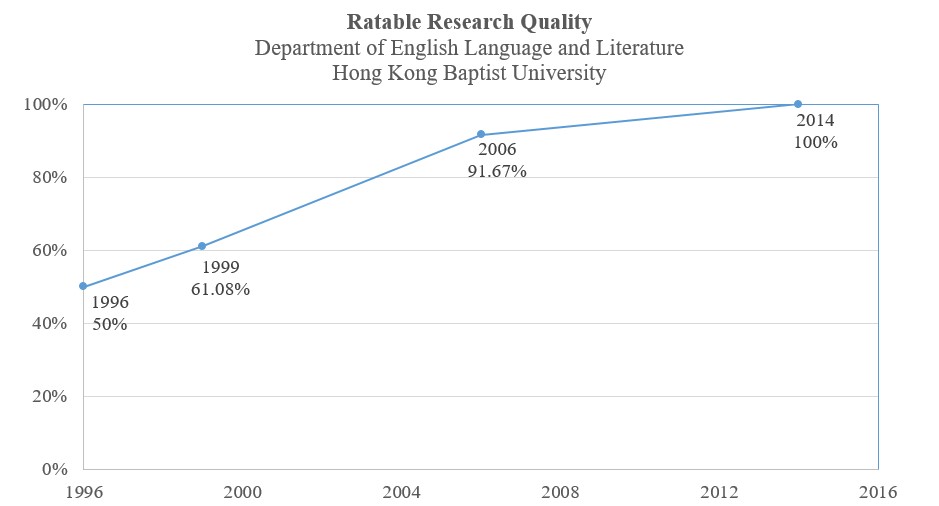HKBU ENG cost centre achieves steadily rising profile in ratable research since 1996

- HKBU ENG cost centre research ranked 1st in Hong Kong among six comparable cost centres
- 100% of HKBU ENG cost centre’s research deemed ratable
- HKBU ENG ranked 2nd in Hong Kong in aggregate (4*) and (3*+4*) scores among six comparable cost centres
- 17% of HKBU ENG cost centre research rated (4*) or “world leading”; 29% rated (3*) or achieving “international excellence”
- HKBU ENG cost centre ranked 1st in Hong Kong in aggregate (2*+3*+4*) scores among six comparable cost centres
- HKBU ENG cost centre ranks among top seven (7) cost centers at HKBU (including Music, Mathematics, and Chinese Medicine) meeting or exceeding the sector-wide (Hong Kong) average
Overview
The Department of English Language and Literature comprises of linguists and literature scholars. We have continued to maximize the benefits of this disciplinary plurality to build an open, complementary, and innovative research environment wherein colleagues consolidate their research and sharpen its sense of direction. We scored 17% 4* and 29% 3* in RAE2014. Our research areas cluster under three broad themes: Linguistics, Comparative Literary Studies and Hong Kong Studies.
Research Strategy
Much of our research leads to the liberalization of English. In turn this creates a framework for creative writing, criticism, and theory in Hong Kong Anglophone expression. Our strategies resolve to:
People
We strive for diversity, balance, and long-term retention in recruiting. Hiring decisions take into account the range of research projects an applicant plans vis-à-vis how these translate into teaching and social impact. In terms of student training, we coach research postgraduates to write papers and present research results with an eye toward peer-reviewed publication and job opportunities internationally. All our research postgraduates in the last six years have been funded by either the UGC or the Hong Kong PhD Fellowship Scheme (HKPFS).
Infrastructure and Facilities
The department oversees two important facilities:
Collaborations
We work closely with such research-support units as the Library and the Graduate School to facilitate research resources, collaboration, and circulation. Internationally, colleagues have developed projects with institutions overseas, including those in Germany, Sweden and China. The Department envisions joint PhD/MA-PhD articulations with foreign universities as an avenue for research postgraduate collaboration.
Esteem and Contribution
Our colleagues are sought after by the media, and have 35 news citations in the census period. We frequently contribute to research councils, professional societies, learned associations, and academic journals via leadership roles, committee work and reputable journal editorships.
The Department integrates the disciplines of linguistics, literature, and comparative studies by pooling its members’ scholarship towards the creation of Hong Kong’s English literary voice. Our research impact types have two major prongs:
(i) make accessible Hong Kong’s English expressions to a global audience;
(ii) integrate local culture into Hong Kong’s English; and
(iii) engage schools and the general public in this historical process of language contact and change.
(i) literary events and
(ii) direct collaboration with the Education Bureau and NGOs.
As we adopt a structured, participatory approach to interact with non-academic groups, we achieve civic mobility, social engagement, and equal opportunity. We have worked on projects such as mobile app development and writing workshops at various locations across the city. We aim to be scalable in our efforts as we inspire appreciation for English-language arts, and have developed long-term, sustainable projects on a city-wide and international scale with documented evidence and archiving.

